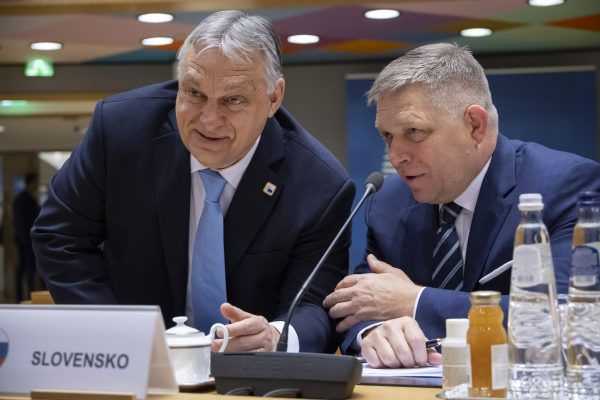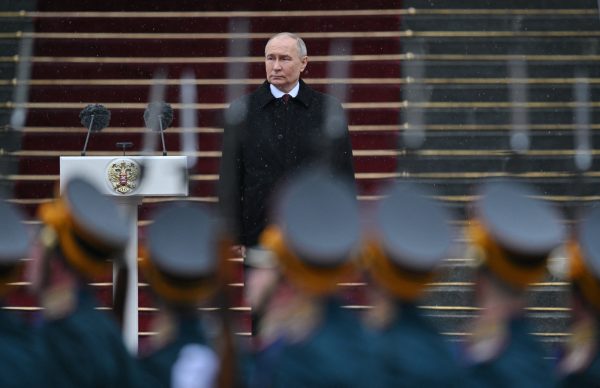When Pope John Paul II visited his homeland, Poland, in 1979, he drew vast, adoring crowds, blowing away the Communist regime’s clouds of fear and lies and showing the world and Poles themselves a true picture of the country. The Pope’s exhortation, “Be not afraid,” echoed with formidable politicians, including Ronald Reagan and Margaret Thatcher, and spelled doom for the evil empire.
The new papal message is rather different. Visiting the Mongolian capital, Ulan Bator, Pope Francis aimed a message of greetings next door, urging Chinese believers to “be good Christians and good citizens.” Yet the Communist dictatorship in Beijing has no concept of citizenship: it demands unquestioning, absolute, constant obedience. Pictures of the brave handful of Chinese faithful who made it to Mongolia to see the pontiff show them covering their faces in the hope of escaping the clutches of the party-state’s surveillance machine. Catholic bishops in mainland China—now appointed only with the Party leadership’s say-so—were banned from traveling to Mongolia.
An even more spectacular debacle came last month during a video encounter with young Roman Catholics in St. Petersburg. Francis told them, “You are the heirs of the great Russia. The great Russia of the saints, of the kings, of the great Russia of Peter the Great, of Catherine II, that great imperial Russia, cultivated with so much culture and humanity. Never forget this inheritance. You are the heirs of the Great Mother Russia, go forward.”
That was odd, to put it mildly. It is hard to imagine the Roman Catholic leader telling Belgian, British, Dutch, French, German, Portuguese, or Spanish believers to celebrate their countries’ great imperial traditions. In the modern view, European empires were greedy and brutal, immediately horrible for the colonized, and ultimately corrosive for the colonizer too. Indeed, if the pope consulted his own church’s history, he would see that the Roman Empire’s interaction with Christianity, from its founding moments, was hardly frictionless.
Moreover, Russia’s imperial sentiments are not just a matter of historical debate. They are alive right now. A few minutes were spent watching Russian television talk show pundits talking about countries in the neighborhood in casually contemptuous and threatening terms. And for Ukrainians, Russian imperialism is a matter, literally, of life and death.
The remarks prompted extraordinary public criticism by the head of Ukraine’s Greek Catholic Church. His Beatitude Sviatoslav Shevchuk decried, in particular, the Pope’s approving references to two Russian tsars, Catherine the Great and Peter the Great, who both strove to extirpate Ukraine’s language, identity, and culture.
However, the Kremlin spokesman Dmitry Peskov paid unctuous tribute to Pope Francis’s ill-chosen remarks. He said the pontiff’s knowledge of Russian history was “gratifying” and “in unison” with the Russian state’s efforts to teach history according to Vladimir Putin’s interpretation. That rang alarm bells, belatedly, and Vatican officials tried to play down the Pope’s remarks. But the damage was done.
It is too easy to blame these gaffes on bad advice. The Vatican’s diplomatic (and intelligence) capabilities are formidable. Some attribute the Pope’s cock-eyed stance to latent anti-Americanism stemming from his early experience under the US-backed Argentine junta of the 1970s and early 1980s. Perhaps. But the worst aspect of this is that he seems not to be learning from his mistakes.
One big risk is that the Holy See dumps its diplomatic recognition of Taiwan (an increasingly lonely stance) in the vain hope of gaining some concessions from the Beijing regime. Another is that pandering to the Kremlin strengthens the war-weary voices in the West who want to arm-twist Ukraine into a truce. It is not just John Paul II that we miss.
Europe’s Edge is CEPA’s online journal covering critical topics on the foreign policy docket across Europe and North America. All opinions are those of the author and do not necessarily represent the position or views of the institutions they represent or the Center for European Policy Analysis.





